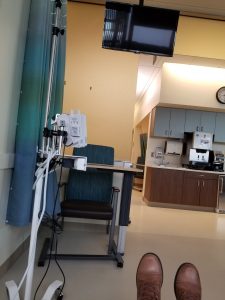As a Rare Disease Patient, I Have to Hustle to Access My Treatment

Because there is little information available about certain diseases, many people may be misdiagnosed or undiagnosed. People with rare diseases are at a disadvantage compared with people with well-known medical conditions. Not only do people with rare diseases have limited information, but also their treatment is often not as prioritized as treatment for better-known diseases.
As someone with a rare disease, I have had to hustle both financially and logistically to access my treatment.
Financial hustle
I was diagnosed with neuromyelitis optica (NMO) in 2012 when the U.S. Food and Drug Administration (FDA) hadn’t yet approved any medications specifically to treat this disease. My treatment was and still is Rituxan (rituximab) infusions, because I respond extremely well to them.
For this reason, I do not use any of the recently approved medications for NMO. Similar to Rituxan, the new FDA-approved medications have potential side effects. At least I know that the side effects of Rituxan are not too bad for me. Additionally, my doctors have advised me to stay on this drug for now.
The FDA has not approved Rituxan specifically for the treatment of neuromyelitis optica. This means that my insurance denies treatment coverage. My doctor needs to appeal this decision every time I submit a new claim. Otherwise, I would be financially responsible for my Rituxan, and the copayment can be expensive. I do not have access to the financial help offered by the Rituxan Immunology Co-pay Program because the treatment isn’t approved for NMO patients.
Logistical hustle
When I first started treatment, I received four infusions per year. The first two were two weeks apart, then six months later, I did the third and fourth infusions two weeks apart.
I received my infusions in the same infusion centers where people with multiple sclerosis received theirs. Most of the MS patients received monthly infusions. I never heard about any of them dealing with logistical complications. However, the infusion center in Florida had numerous issues with my medication. I also experienced this in the first hospital where I was treated in Massachusetts. I always heard something along the following lines:
- “We do not have your Rituxan yet because the nurse/case manager forgot/did not order your medication.”
- “Your medication was delivered to another branch of the infusion center.”
- “Your medicine is not in the infusion center yet. You’ll have to wait.”
I wonder why different facilities in different states experienced the same complications multiple times. It seems like a pattern. It’s always an infusion center that offers treatment for neuromyelitis optica, a rare disease.
This raises some questions:
- If I made the appointment six months earlier, why isn’t my medicine there when I go in for my treatment?
- If I paid my copay to the pharmacy in advance, why isn’t the medicine delivered on time, according to the infusion centers?
- Where is the disconnect — the pharmacy or the infusion center?
- Why does this happen so often?
- Are NMO patients not treated the same as patients with other conditions because we receive our treatments less often?
What amused me the most is how naturally some infusion center staff handle this situation. But not all of them have this attitude. Some of them almost find a way to blame me somehow. I understand that complications can occur, but when this happens so often, something is not right.
When a logistical issue happens, following is how it affects me as a patient:
- It causes me stress.
- I waste time waiting for a medicine that someone failed to order.
- I have to make unnecessary phone calls to find out where the disconnect occurred.
- It creates distrust towards the health provider responsible for administering the treatment.
- I perceive it as the provider having little respect for the patient.
Despite the unnecessary hustles, I have always received my infusions. I have a positive opinion of the United States healthcare system. I know that pharmacies and health facilities are businesses, and that is OK.
Nevertheless, sometimes I cannot help but think that neuromyelitis optica patients are not a priority in healthcare. I support with the fact that until now, we did not have a medicine that could be commercialized, and statistically, there were not enough of us with an official diagnosis to make a business profitable.
***
Note: Neuromyelitis News is strictly a news and information website about the disease. It does not provide medical advice, diagnosis, or treatment. This content is not intended to be a substitute for professional medical advice, diagnosis, or treatment. Always seek the advice of your physician or other qualified health provider with any questions you may have regarding a medical condition. Never disregard professional medical advice or delay in seeking it because of something you have read on this website. The opinions expressed in this column are not those of Neuromyelitis News or its parent company, Bionews, and are intended to spark discussion about issues pertaining to neuromyelitis optica spectrum disorder.








Leave a comment
Fill in the required fields to post. Your email address will not be published.